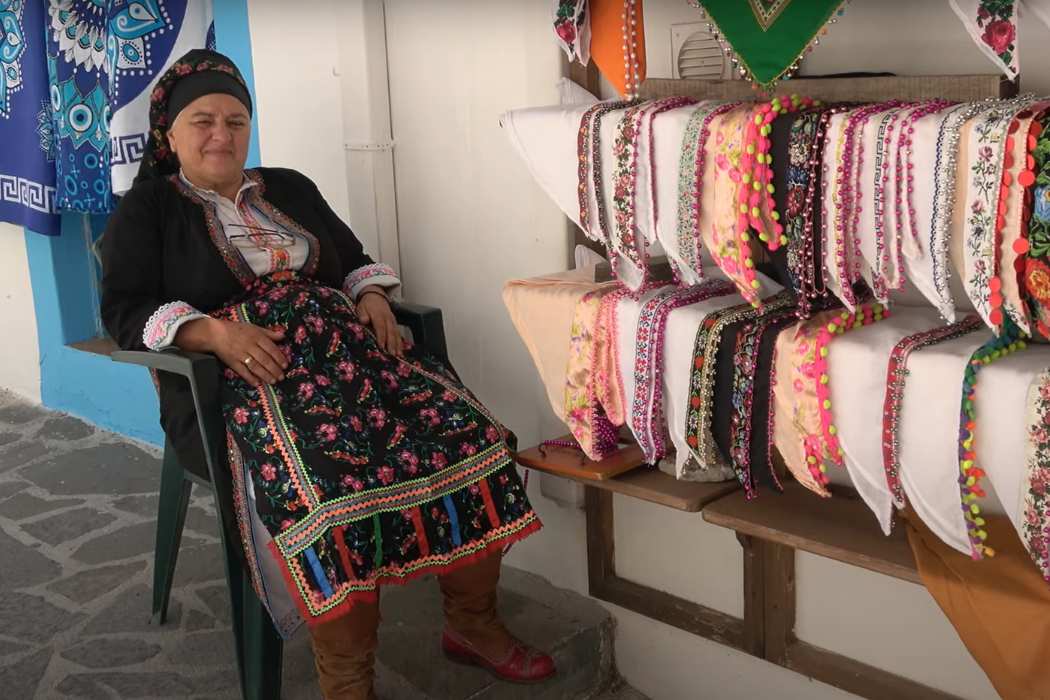Where Women Rule: Inside the Matriarchal Village of Olympos, Karpathos
High in the rugged mountains of Karpathos, tucked between wind-whipped ridges and deep-blue Aegean vistas, lies the remote village of Olympos—known to locals as Elympos. Here, time doesn’t just slow down—it folds in on itself. And at the heart of this rare, slow-moving world are women. Strong, resilient, and enduring women who have, for centuries, shaped the soul of this village. Olympos is one of the last remaining matriarchal societies in Europe—a place where daughters inherit the family home, women are the stewards of tradition, and the rhythms of life still follow the pace set by grandmothers and great-grandmothers.

A Village Set Apart by Geography—and History
Olympos’ matriarchal roots are deeply tied to its geographical isolation. Until as recently as 1980, the only way to reach the village was by foot—a six-hour hike through mountainous terrain starting at the plateau of Messicori. The modern road arrived late, but by then, the culture had already steeped like strong tea in centuries of seclusion. This isolation wasn’t just inconvenient; it was protective. Olympos’ location high on a ridge between Mount Agios Elias and Koryphios offered a vantage point against pirate raids from the sea. Over time, this detachment allowed ancient customs to survive nearly untouched, and with them, a societal structure rarely seen in the modern world.
Women at the Helm
In Olympos, women didn’t just keep the hearth—they held the keys to the entire home, the land, and the family. Property is traditionally passed down to the eldest daughter, not the son. In many cases, the father was gone—off working abroad for a decade or more—returning to children already grown. In his absence, the mother was the decision-maker, the breadwinner, the emotional anchor.
"Η οικογένεια έμεινε στα χέρια της γυναίκας," locals say—the family remained in the hands of the woman. And even today, as you walk through the steep, narrow streets of Olympos, you’ll see them—women in traditional dress, carrying bundles of firewood, working their olive trees, and weaving, always weaving, stories into fabric.
Symbols in Stone and Cloth
As you arrive via the village port of Diafani, your eye might catch something curious—statues of women, standing proud and symbolic. One gazes longingly toward the sea, a silent tribute to the generations who stayed behind while husbands and sons sailed away. She is the embodiment of the phrase, "she holds the Thermopylae"—a guardian of hearth and heritage.
Inside Olympos, these symbols multiply. Intricately embroidered dresses tell stories of fertility and resilience. The craftsmanship passed from mother to daughter isn't just artistic; it's a declaration of strength and continuity. The local women have worked “από το πρωί μέχρι το βράδυ” (“from morning till night”), in the past on farmland, now in olive groves, striving to preserve a way of life even as the world changes around them.
A Culture Under Threat
But even the mightiest matriarchy isn’t immune to time. Since the 1950s, Olympos has faced a steady population decline, plummeting from 1,400 to just around 200 permanent residents today. Most of the youth—especially the women—have left in search of education, opportunity, and the modern life they were denied in the village.
“It’s a mess,” one elderly resident says. “The women are leaving. The men too. What can we do, kids? This is what was handed down to us, and we’re trying to keep it going... but the next generations?”
This exodus is more than demographic; it’s existential. Without young women to carry forward the culture, the matriarchal legacy of Olympos may fade into memory. Some women fear that soon their daughters will only return as tourists, strangers in the homes they once might have inherited.
Still Holding On
And yet—there’s hope. The village still draws curious travelers and culture lovers who marvel at its unique societal structure. Visitors who arrive on foot via the old trails get a glimpse not just of scenic beauty, but of a culture carved into cliffs and passed hand-to-hand like a sacred heirloom. On the central square—Pleti—life still pulses. The windmills, though in disrepair, whisper stories. The churches, particularly the grand Chiemicitis Theotokou, still welcome villagers on August 15th for the island’s most important celebration.
And the women—those over 60 who still wear the bright, intricate traditional garb—stand as living monuments to a vanishing world. They are the memory-keepers, the last matriarchs. "Είμαστε δυναμικές γιατί μάθαμε από μικρές τη δουλειά," one woman tells us. “We are strong because we learned from a young age what work is.”
Visiting Olympos: A Journey Back in Time
If you're seeking an island experience that goes beyond beaches and cocktails, Olympos offers something profoundly different: a living window into a social structure that defied the norms of both Europe and Greece. Whether you come for the hike, the history, or the heart of the women who shaped this village, one thing is certain—Olympos stays with you long after you’ve left.
So lace up your boots, follow the ancient blue-marked trail, and make your way to a mountaintop where women still whisper the wisdom of generations. Come witness a world where, for once, history didn’t silence the female voice—it handed her the microphone.






